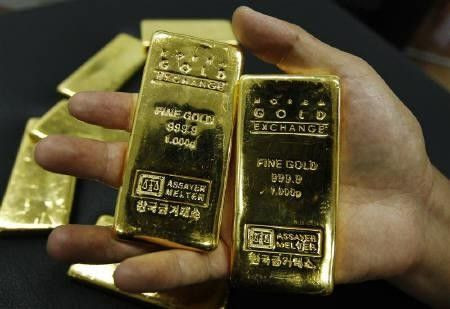Gold Likely to Hit Biggest Weekly Loss since Sept

Gold inched up on Friday helped by a weaker dollar and buying after the prior session's falls but was still on track for its biggest weekly loss since September as euro zone debt contagion worries spooked investors.
Silver also rose slightly after falling almost 6 percent in the previous session amid a broad retreat in both precious and industrial metals, triggered by a flurry of stop-loss selling.
European debt contagion fears and rising money market stress were making investors nervous even though Italian and Spanish government debt yields fell as the European Central Bank (ECB) bought bonds in the secondary market, but held close to unsustainable levels.
Spot gold edged up 0.17 percent to $1,724.2 an ounce by 1424 GMT, from $1,721.19 late in New York on Thursday. In the previous session, it fell 2.5 percent and hit a 2-1/2 week low at $1,709.64 an ounce and it was on track for a weekly decline of almost 4 percent. U.S. December gold futures were at $1,722.10 an ounce, up 0.12 percent on the day.
Supporting gold, the euro rose against the dollar on Friday as speculation the ECB may start lending to the International Monetary Fund to bail out bigger euro zone economies helped lift the embattled bloc's currency.
A weaker dollar makes dollar-priced commodities such as precious metals more affordable for holders of other currencies.
I think it's a bit of a bounce back after a shock yesterday but I wouldn't get too excited, Matthew Turner, an analyst at Mitsubishi said. There is a bit of bargain-hunting going on; the euro prices are flat and that implies that the dollar gains are to do with the (weaker) dollar, he added.
Gold has confounded market watchers by refusing to behave like a safe-haven and instead has tracked equities over the past few weeks, but the escalating European debt crisis could see bullion ditch its risk-asset mantle and return to record highs.
There is a strong argument that this euro crisis should support gold, especially if the solution to it will involve printing money and easing monetary policies, which are inflationary measures. On the other hand these big shocks are making investors nervous, Turner said.
Bullion is often used as an inflation hedge by investors.
The longer uncertainty dwells, the more chance there is for bullion to bounce back up, given ultra-low currency yields globally, VTB Capital said in a research note.
SOLID FUNDAMENTALS
Although investors were focusing more on macro news, market fundamentals seemed supportive for gold. Demand for gold rose by 6 percent to a 1-1/4 year high in the third quarter of 2011, driven by central bank purchases and European demand for bullion against the backdrop of the escalating euro crisis, a report from the World Gold Council, an industry group showed on Thursday.
There is positive market news like central banks buying, which is supportive, Turner said. The only problem with that is that it is in the past but it might continue as a lot of central banks hold dollars and would like some diversification, he added.
Also showing increasing interest in gold-related assets, holdings of the largest gold-backed exchange-traded-fund (ETF), New York's SPDR Gold Trust rose 0.95 percent from Wednesday to Thursday, while that of the largest silver-backed ETF, New York's iShares Silver Trust remained unchanged for the same period.
Spot silver was up about 1 percent to $32.01 an ounce from $31.68 late in New York on Thursday; platinum rose 0.65 percent to $1,588.3 an ounce from $1,578 and palladium fell 0.29 percent to $603.72 an ounce from $605.47.
© Copyright Thomson Reuters 2024. All rights reserved.


















